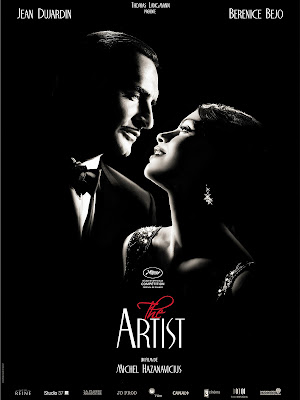Rating: 5/5
by Brian Kesler
'The Artist,' reminded me of another French film called 'The
Illusionist.' Both are about extremely talented men who have mastered
their craft and must struggle and watch as their profession fades and
dies, and so do they. They are also both incredibly silent films. 'The
Illusionist' has muddled dialogue that isn't meant to be understood and
is incredibly thoughtful and ponderous. 'The Artist' is actually a
silent movie. Yes, a black-and-white silent movie with subtitles in
between shots. It also happens to be funny, charming, and magical. It
fills you with the same giddy feeling that, say, most Pixar movies do.
It is not to be missed, and will most likely sweep the Academy Awards.
The film centers around silent film star George Valentin as he propels a
young girl into stardom. She goes on to do talkies and makes it big. He
desperately tries to save his career and uphold his reputation as a
silent star, but becomes impoverished and forgotten.
'The Artist,' like 'Avatar,' is less concerned with the originality of
its story and more concerned with how it conveys that story in new and
exciting ways. New and exciting? you say. It's a black-and-white silent
movie, how is that new and exciting? First, I'd bet many young people
these days - hell, many older people - have never seen a silent movie.
It is a joy to see a return to one of the world's great lost arts that
will introduce many to the medium. But, that doesn't mean the movie
doesn't push the envelope. On the contrary, there are many inspired
scenes, including one in which George dreams of his life converting to
sound. He takes a drink and sets the glass down. Ping. He looks at the
glass. He picks it up and sets it down again. Ping. Suddenly, all around
him are noises that drown him, threaten him, he has no voice. Another
scene at the premiere of his last attempt of stardom shows very few
people in the audience. One person in the audience is the girl he helped
to become a star, Peppy Miller. She watches the silent film in which
Valentin is being consumed by quicksand, and those around him are
powerless to save him. Miller watches and cries as the pitiful
expression on Valentin's face disappears beneath the sand. In the
theater next door, Miller's newest talkie plays to overwhelming
audiences. The scene in which Miller and Valentin first meet and act
opposite one another in a dancing sequence is a gift of storytelling. We
see them do take after take of the same shot and witness the
relationship dynamic that forms between them during each one.
Some argue that the characters in the film are too simple and not
developed enough. On the contrary, this film emulates a subtlety of
storytelling that existed back in the '20s, when Buster Keaton could
move an audience with variations of one stony-faced expression. Every
movement, every facial expression, amounted to the character, and it
does so here. Jean Dujardin and Berenice Bejo deserve credit for
perfectly sculpting these characters with an amalgamation of silent
acting craft and modern methodology. She plays the ambitious young girl
who catapults into stardom but can't rid an ongoing sympathy and
obsession for the man who once danced with her. He plays the once-famous
star, consumed with such self-pity and despair, and hopes of making a
comeback. As another silent star with the same predicament famously
said, "I hate that word. It's a return. A return to the millions of
people who've never forgiven me for deserting the screen." She also
responded to a man saying, "You used to be big," with "I am big. It's
the pictures that got small." Valentin has the same misconceptions, the
same denial and, like Norma Desmond, needs to come to terms with
reality.
The humor of the film is actually rather biting and modern. Valentin's
film has flopped and Miller's 'Beauty Spot' is a box-office smash and he
comes home to find a note from his wife, telling him she's left. This
would be rather tragic, except that the end of the note reads: "P.S. You
should see 'Beauty Spot,' it's incredible." There are certain in-jokes,
as well. The cliche of the dog saving the day by getting the police is
parodied here, as are several cliches of the silent era.
The film is not without faults. The choice to cast movie stars in
supporting roles was a mistake. John Goodman, James Cromwell, and
Malcolm McDowell are all known primarily for their voices. To have them
not speak was particularly irritating. Also, the majority of the score
is original and played to perfection. There is one critical scene,
however, that uses Bernard Herrmann's love theme from 'Vertigo' as
underscore and, for those that have seen 'Vertigo' and recognize that
music, it distracted from the tension. The love theme from 'Vertigo'
belongs in only one movie. 'Vertigo.'
The silent movie has, at last, been recognized as one of the great art
forms of the 20th century. In the 1950s, people loved to make fun of the
medium with films like 'Sunset Boulevard' and 'Singing in the Rain.'
This year, there have been two wonderful films made in tribute of the
silent movie. 'Hugo' and 'The Artist,' both of which are the top
contenders for the Oscar. It was a glorious year for movies. There is a
moment at the end of this film when the two lovers avoid tragedy and rid
themselves of pride and come together at last. The moment is played
with no score, completely and totally silent, and you could have heard a
pin drop in the theater. It was an incredibly moving scene.



No comments:
Post a Comment